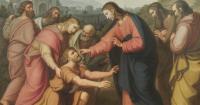
Mark is the only evangelist who names the beggar by the roadside. Bartimaeus means "Son of Timaeus", which translates as "honourable". At first sight the poor man seemed anything but honourable. One can imagine him sitting by the road, huddled in his cloak, being spurned and possibly mocked by passers-by. He was their shadow. He represented the things that they wanted to avoid, such as poverty and disability, regarded as God’s punishment for sin. They needed him to be unseen and unheard. Bartimaeus in his loneliness must have had plenty of time to reflect. However there seems to have been nothing wrong with either his intelligence or his hearing, for he knew about Jesus and his status as son of David. He also trusted him completely and, though people shouted unkindly at him to be quiet, he was determined to ask Jesus for help.
When he threw off his cloak, it was though he was casting aside his old life, knowing that the Lord would heal him. He was not worried any more about it being stolen, because he was sure his sight would be restored and he would be able to find it again. Jesus asked Bartimaeus what he wanted. Maybe this was to make sure that the beggar was ready for this change of life. It may also be an indication that it is important for us to tell God our needs. It allowed Bartimaeus to make an act of complete faith, which he did. He was quite sure that he wanted to be healed. The man may have had physical blindness but spiritually he could see a great deal better than many of those who surrounded Jesus.